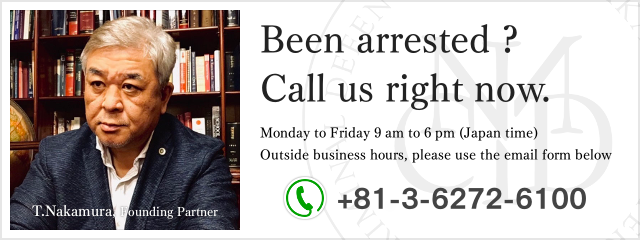Possession of Rush
Case Background
Our client was questioned by the police when he was walking in the area of Kabukicho, Shinjuku, Tokyo. When questioned by the police, our client consented to a search of his possessions. He also consented to the police taking possession of a bottle that they believed was rush and also to taking a urine test. The police informed our client they would contact him again as soon as lab tests were completed on the contents of the bottle.
Issues That Arose with the Case and Our Solutions
1. Our client needed to avoid being arrested.
In a drug case, it is usual for the police to take a suspect into a custody. When a suspect is a doctor, lawyer, teacher or high profile figure and they are arrested, the possibility of their name and case being reported by the media is high. Our client fitted this profile and wanted to avoid being arrested so as to avoid any negative media coverage that could potentially affect his career and family.
Being retained as our client’s defense lawyers, we prepared all necessary documents to request the police not to arrest our client and submitted them at the earliest opportunity. Our request was successfully accepted, and our client’s investigation was concluded without him being arrested or any reports being made in the media.
2. The prosecutor insisted that they would contact his workplace.
During the interview with the prosecutor, our client was asked if his workplace knew of his situation. The prosecutor’s intention was to decide our client’s disposition based on what kind of disciplinary action his workplace took.
We prepared documentation and made an appointment with the prosecutor. We informed the prosecutor that our client’s workplace is unaware and does not need to be informed of our client’s situation. Stating that the prosecutor contacting his workplace and notifying them of our client’s situation is a punishment. The prosecutor should not be able to inflict such a punishment during the investigation, before the court has reached a verdict.
The prosecutor still insisted that in any event he would contact our client’s workplace in regards to our client’s situation. We discussed with our client all possible issues regarding the reporting or not reporting of his situation to his workplace. Our client decided to inform his workplace of the situation before the prosecutor contacted them. We prepared supporting documents for our client to submit to his workplace. In addition, we attended a meeting of our client with his superiors, for his support.
Result of the Case
Our client was allowed by his workplace to resign voluntarily even though it would have been possible for his workplace to fire him given the circumstances. In this way, our client was able to leave his workplace with severance pay and with the chance of finding new employment without a blemish on his professional employment record.
The prosecutor decided not to prosecute or fine our client. Our client was able to avoid having a criminal record.
















